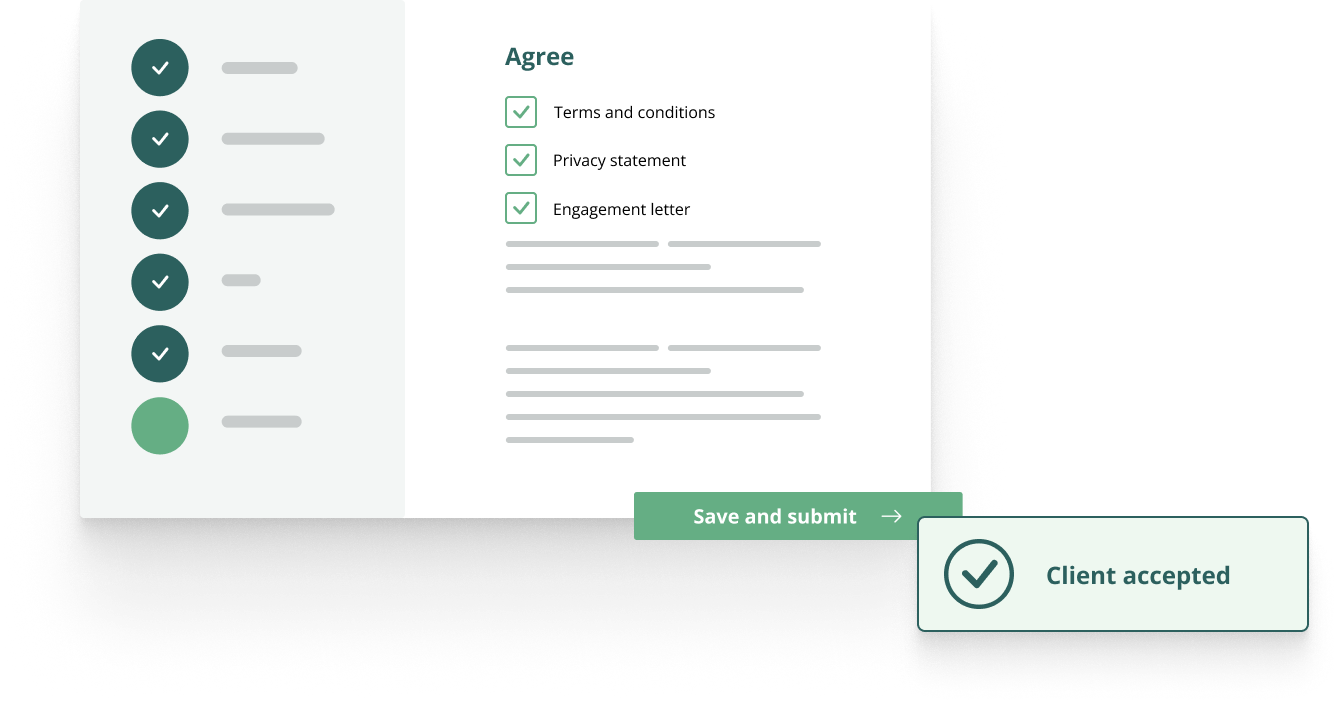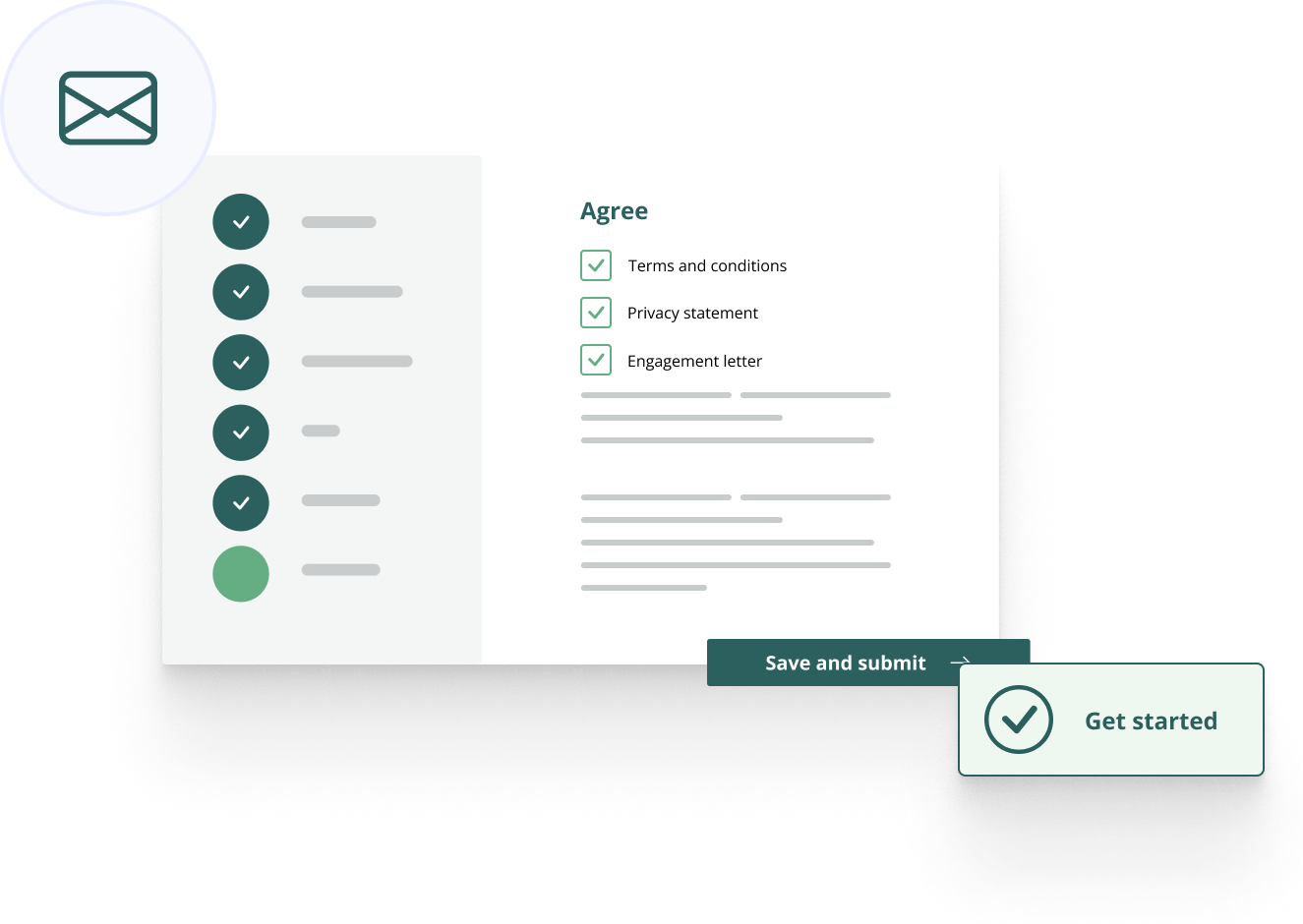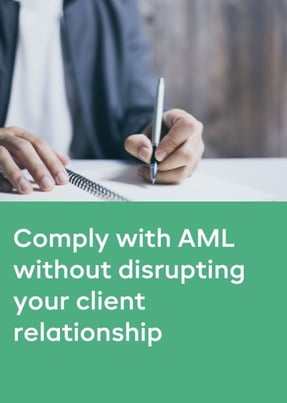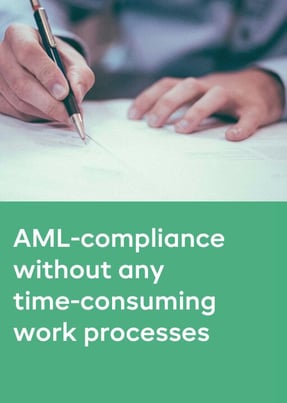- Products
- RegLab for ...
- Knowledge centre
Download the AML glossary >
 Discover the essential AML compliance terminology and gain instant access to a comprehensive guide
Discover the essential AML compliance terminology and gain instant access to a comprehensive guide - The company
Working at RegLab >
There may not be any vacancies that perfectly match your profile, but that does not mean there is no room for someone who can improve RegLab.
- Book a demo
Approve engagement letter
In the context of the AML Customer Due Diligence, it is essential that every client receives and approves the engagement letter, general terms and conditions, and the privacy statement. The client must agree to the engagement letter again when changes occur, such as when general conditions or fees change.
Engagement letter
An important part of the AML Customer Due Diligence is the engagement letter. This is where you enter all name and address details, rates and agreements. Not only is this mandatory, but you must also be able to submit approved engagement letters during supervisor’s audits.
What does the engagement letter process look like? Do you need an engagement letter for every file and where do you save it? Has an AML paragraph been included? This is just a small selection of the main questions involving the engagement letter.
RegLab takes care of sending and monitoring the approval of the engagement letter completely digitally. This engagement letter serves like a basic document to record agreements made and any (general) conditions, such as rates. The aim is to prevent discussions afterwards. It is mandatory to send these out as complete as possible and to receive them back.
In practice, it proves difficult to send out this engagement letter, general terms and conditions and privacy statement in a structural way. Subsequently, another challenge presents itself: to get back the approved documents and store them in a central location, which is essential for the internal AML administration and for the supervisory authority.

For the lawyers among us:
What does Voda say about the engagement letter?
You used to work as a lawyer without an official agreement. In retrospect you did what was necessary to justify the bill. Nowadays, the engagement letter, from the Dutch Bar, through Voda (Article 7.5) is mandatory.
Explaining the engagement letter as stated in Voda, Article 7.5
“When confirming the agreement for services, it should be made clear to the client who on the side of the lawyer is a party to the agreement. If a lawyer is involved in the execution of the assignment who is not permanently attached to the office, the client will be informed about this in the engagement letter. It must be clear to which council of the bar the lawyer belongs, how the lawyer is insured in terms of his professional liability risk and which office complaints procedure applies to the lawyer with regard to the work he performs on behalf of the client.”
Source: Dutch Bar Association
Is the engagement letter mandatory?
Based on the above, it is clear to the legal profession that the engagement letter is a must. Fortunately, this is an obligation with a clear goal: to avoid hassle down the road and to provide clear insight into how you will or will not represent the client (and for what financial compensation). A written engagement letter is therefore essential when accepting a case and onboarding a client. Moreover, it forces you to think carefully about the feasibility and strategy of the case. Ultimately, this benefits the quality of your services and the client relationship.
AML aspect within the engagement letter
Does the engagement letter also mention anything about the AML? Indeed, today’s engagement letter should include a paragraph that states, among other things:
- that the lawyer, civil-law notary or tax consultant must comply with AML;
- that certain information is requested from the client for this purpose;
- how data privacy is secured.
Engagment letter: aspects
If we look at the model of the Dutch Bar Association, then, in addition to the above-mentioned AML aspect, the following subjects are also a fixed element of the engagement letter:
- Business description;
- Name and address details of the client and counterparty and lawyer/authorised party;
- Whether the client qualifies for financed legal aid, including an explanation;
- Information about any legal assistance available;
- Rate agreements;
- Information on professional liability;
- Agreements regarding confidentiality, AML registration and ICT;
- Customer arrangement and how to deal with disputes.
Sending the engagement letter
We recommend taking a closer look at the process of an engagement letter. In daily practice, the following happens often: the support staff prepares and sends the engagement letter to the lawyer with the request to forward it to the client after approval. Since the lawyer is very busy, he/she forgets to follow up. Or he/she does send it, but there is no check whether the client approves it. When the client sends back a signed engagement letter, there is still no assurance that it is stored in the correct central location. In addition, are all descriptions in the engagement letter accurate, up-to-date, and directed to the right place? This requires a thoughtful and efficient approach. RegLab is here to help.
Engagement Letter:
fast automated approval with RegLab
When it comes to a mandate agreement, we face two challenges:
-
Creating an engagement letter, receiving the return and saving it correctly. Are you still looking for an example engagement letter? The Nova has made a model engagement letter available.
- Keeping the agreements up to date, especially for long-term projects. What if the terms and conditions change in the course of time? Many offices struggle with this process.
With RegLab, this is a thing of the past. RegLab's fully automated software ensures that:
- the engagement letter is sent automatically.
- the information and documentation to be supplied are saved in a central place.
- the status is tracked.
- automatic reminders are sent if the client responds (incompletely).
- reports on the status of the engagement letter can be generated.
- new versions of terms and conditions are sent and monitored centrally.
- an audit trail for the supervisor is shown at the push of a button.

Is an engagement letter part of Customer Due Diligence (CDD)?
Customer Due Diligence (CDD), also known as 'Know Your Customer' has become increasingly important over the years. This is because cases involving money laundering, fraud and terrorism are becoming increasingly common. For this reason, and thus also in connection with the AML, it is essential to know who your clients are.
When is CCD required? Customer Due Diligence is a tool for firms to get to know their clients better. If you want to work the safe way, the CDD will protect you from interacting with people who will abuse your trust, which will ultimately impact your reputation.
If you are subject to the AML, you must prepare a CDD policy and implement it consistently. In this process, you collect crucial information about the client and assess it for any potential risks to your office. This will enable you to identify any money laundering/terrorist financial activities.
CDD consists of the following aspects:
- Client acceptance, identification and verification.
- The identification and verification of the ultimate beneficial owner (UBO).
- Determining the purpose and intended nature of the business relationship.
- Monitoring and reviewing clients, accounts and transactions.
- Risk management.
An engagement letter is therefore not a mandatory part of the CDD, unlike what many might think. Just like CDD, it is an important part of the AML policy under which the engagement letter is mandatory. You can read more about CDD and Know your Customer on this page.

KYC: the meaning of it
What is the meaning of KYC, what does a KYC procedure entail and what role does Customer Due Diligence play. Read the answers in this article





